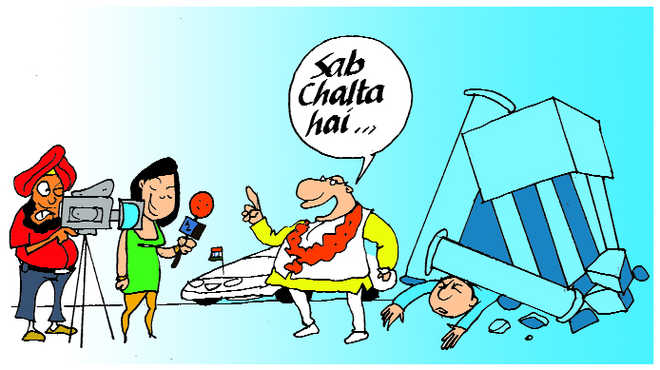
Illustration: Sandeep Joshi
MANJU GUPTA
It always feels bad, but this time because it involved a close friend, it felt worse. The way we Indians are maimed, mutilated and mowed down in freak accidents. Last Friday evening the founder's day celebration of our Health University was in full swing when the dust storm hit. The gust of wind toppled a five-quintal truss pillar standing near the stage. My friend was one of the unfortunate five who were crushed under it, suffering multiple fractures, including a spinal injury.
She was declared unlucky or lucky depending on one's outlook and upbringing. Most felt that matters could have been worse. She could have suffered permanent neurological damage, lost a limb or even her life. I, on the other hand, thought that with little caution, things could have been better. If the pillar was secured to the ground, as it was supposed to be, she would not have been injured at all. Perhaps, in this case some will feel that we should be more forgiving. After all, what are the chances of a temporary structure not swaying in a dust storm that had the power to uproot trees and electric poles, damage billboards and throw water tanks off rooftops (one landed in my garden!) We can defend the organisers and blame the wind velocity, but the truth is that unforeseen and extreme situations have to be considered while framing safety guidelines. More importantly, we, the citizens need to diligently follow these rules, once they are in place.
This is a tall order considering the chaos around us. Look at all the preventable disasters, which recur with astonishing regularity. Collapsing bridges, pillars buckling under their own weight, roads that cave in to swallow cars, precariously piled mountains of garbage, crumbling buildings, slums that turn into fireballs, highways that double as deathtraps and open manholes that live up to their name. All these incidents of the recent past demonstrate our usual callous, careless attitude. If we chase perfection, we might catch excellence. But in true Indian “Sab chalta hai” style, we aim for mediocrity, just enough to get by. It isn’t surprising then, that things unravel and situations spin out of control so often.
To add to this callous attitude, we are a fatalistic society with amnesia. After every tragedy there are inquiries and assurances. There are also lessons which are never learnt and life goes on, till the next accident catches us off guard.
I am reminded of a joke which sounded funnier in my patient's rustic Haryanvi dialect. Once a man fell from the second storey of his house and died. The crowd that gathered around the body noticed that there was a sharp peg jutting out from the ground next to where the man had landed. One wise man remarked, “Thank God! He didn’t fall on the peg”. This aptly reflects our attitude. Even in the worst situation the average Indian will find something to be grateful for. This may be good in other spheres of life. But if we keep dismissing acts of negligence as God’s will, shrugging them off as pre-destined; if we keep imagining worse situations and being thankful for what could have happened but didn’t; how will we ever reach the much needed standards of caution and care? We have to realise that freak accidents are a result of bad planning and if examined closely, all natural disasters have an element of human error!
(The writer is a gynaecologist based at Gharaunda)



























